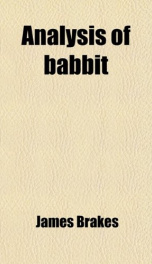analysis of babbit

Purchase of this book includes free trial access to www.million-books.com where you can read more than a million books for free. This is an OCR edition with typos. Excerpt from book: CHAPTER III. Lead. (Plumbum.) Mentioned in Ex. XV, 10. It was found in the Sinaitic rocks before the time of Moses, and was known to the Israelites and the Hebrews. It was anciently used to purify silver. Observed by Homer. Pliny gave the name of plumbum nig ruin to lead and plumbum canidum to that of tin. The alchemists in their writings, designated the metal by the sign of Saturn. Properties, etc. Chemical symbol, Pb; atomic weight 207.20; tetravalent; Sp. Gr. 11.371; molten 10.88 (327C.)2; melting point 326.2C.2. Fuses at 325.C. Volatilizes at a strong white heat, air excluded. Boils at 1525C.; specific heat at about melting point .034t; latent heat of fusion 4.00 Cal.5; heat conductivity (Ag=lQQ) 8.5"; increase in volume at about melting point 3.7%7; electrical conductivity (Ag=lOO) 8.31; casting temperature 500 C.; color bluish-gray, generally known as lead gray; strong metallic lustre when freshly cut, but when exposed to the air the surface is soonoxidized to the oxide or carbonate, which protects it from further corrosion. Structure' granular, as shown by certain etched surfaces, also crystals obtained of regular octahedrons. Combinations of cubes and octa- hedra crystals have been formed in the working of certain metallurgical processes. Crystalline plates of Pb are formed by the voltaic action of metallic Zn on Pb solutions; tough, ductile, very soft and malleable, but tenacity the lowest of any common metal; contracts on solidifying, forming a convex surface; the surface of the molten metal absorbs oxygen rapidly from the air, forming PbO or PbO2, according to the degree of heat used. The action of distilled or rain water on lead is similar to that of an acid. The 2 PbCO2+Pb(HO)2 which is formed generally under these conditions, acts as an energetic poison. re...
Info about the book
Author:
Series:
Unknown
ISBN:
0321369440
Rating:
2.5/5 (4)Your rating:
0/5
Languge:
English
Users who have this book
Users who want this book
What readers are saying
What do you think? Write your own comment on this book!
write a commentif you like analysis of babbit try:
Other books by this author
Do you want to exchange books? It’s EASY!
Get registered and find other users who want to give their favourite books to good hands!

